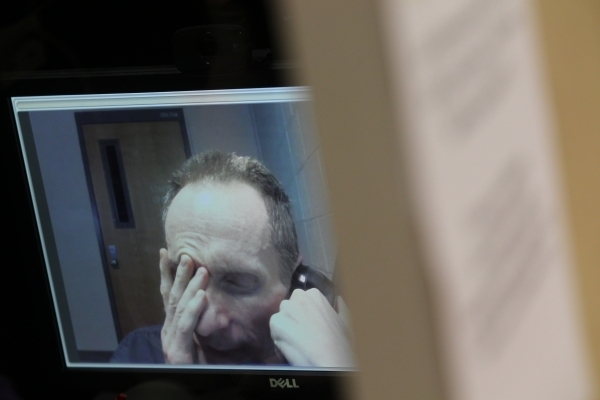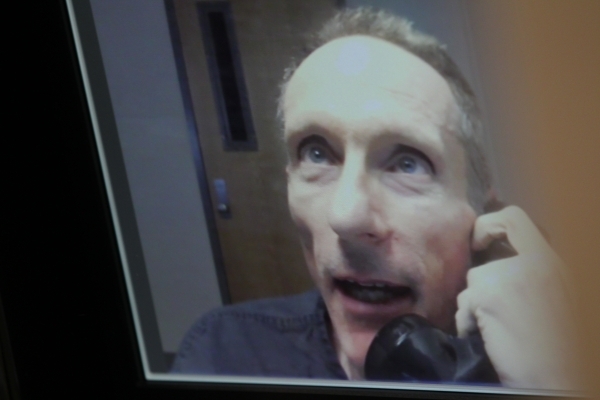Uninsured, immigrants often target of medical scams
People practicing medicine without a license most often target the uninsured or those in the country illegally.
Authorities say a Las Vegas man ran such a practice and might have exposed dozens to infectious agents or blood-borne pathogens.
"I'm very sad that people felt they had no other choice than to go to this clinic," said Dr. Joe Iser, chief medical officer for the Southern Nevada Health District.
Rick Van Thiel, 52, faces charges of practicing medicine without a license, possession of a gun by a prohibited person, possession of drugs and issuing drugs without a prescription. He was arrested after Las Vegas police and the FBI last week raided a house and lot near the intersection of Owens Avenue and Nellis Boulevard.
Websites Thiel used to advertise his services say he can cure HIV, get women "un-pregnant" for cheaper than the cost of an abortion and provide treatments for cervical, ovarian and uterine cancers.
But experts say understanding those complex diseases and procedures requires a lifelong dedication to the medical profession.
Thwarting imposters and unlicensed caregivers challenges public health officials and law enforcement. Backroom surgeries and underground medical procedures can be performed and illegal medications dispensed often without detection, unless tragedy strikes. Such people can deliver health care, dentistry, antibiotics and other medications without a prescription.
Vulnerable population cited
Fear of deportation, language barriers, embarrassment and unfamiliarity with the U.S. health care system lead many immigrants away from established medical facilities, said Emma Sepulveda, director of the Latino Research Center at the University of Nevada, Reno.
"It's a difficult thing to stop. You have a very vulnerable population and a criminal element that works in the shadows. That's a tough combination," Sepulveda said.
Law enforcement and medical board officials must rely on reports from people who suspect the unlicensed activity is taking place or because of an adverse outcome where the patient needed additional medical care.
"There's really no way to be proactive," Las Vegas police officer Michael Rodriquez said. "It's all reactive investigations."
Unlike most unlicensed providers, Van Thiel maintained the websites itsonlynatural.me and 49days.me and advertised on Craigslist. Health district officials want to talk to anyone who received care at his facility at 4928 E. Monroe Ave. People can call 1-800-506-1435 or go to www.fbi.gov, and all information will be handled in accordance with medical privacy laws, they said.
About two dozen boards license and oversee medical professionals in Nevada including chiropractors, dentists, nurses, occupational therapists, pharmacists and podiatrists. Each board investigates complaints against its licensees, and confirms identities, licensure and other information before credentialing a practitioner into a medical staff or provider network.
"We work on the basis of complaints," said Dr. Ronald Hedger, president of the Nevada State Board of Osteopathic Medicine. "But if they don't have a license, we have no authority over them. It's like our hands are tied."
Nationwide problem
Hedger has heard estimates of hundreds of unlicensed medical providers working nationwide, and he knows that means many must be operating in Nevada.
"This is a money-making scheme that goes on all over the country," he said. "People don't have health insurance, and they can't afford treatment so they're going to someone because a friend went there."
Gina Darvas, a prosecutor in the consumer protection unit of the San Diego County district attorney's office, said it's difficult to say how many unlicensed medical providers are operating in the U.S., but her office handles a handful of cases each year. The incidents range from prescription medications being sold at swap meets to people performing abortions and other surgical procedures with little or no training.
Former Nevada Attorney General Frankie Sue Del Papa led a task force that produced a call to action in June 2012 to raise awareness and help prevent people from falling victim to fake health care practitioners. She said part of the problem rests in how doctors and other medical professionals operate in other countries, especially Mexico. Immigrants probably just assume people possess the licenses they claim and see nothing unusual about receiving health care in a residential area.
"The way people access their health care in other countries may not be the way we do here in the United States," she said.
The effort Del Papa led began after the death of Elena Caro, who received an illegal cosmetic procedure in the back of a Las Vegas tile shop in April 2011. Ruben Dario Matallana-Galvas and Carmen Olfidia Torres-Sanchez were sentenced to four to eight years in prison in connection with Caro's death and have since been released from custody.
Del Papa's effort led to the campaign "Say No to Underground Doctors!" or "¡No a Los Medicos Clandestinos!" to promote consumer education, but the effort also needs to be supported by aggressive enforcement, she said.
Preventive measures
Before people choose a doctor, they can check with the Nevada Board of Osteopathic Medicine, the Board of Medical Examiners or the other agencies that regulate health care professionals to verify the physician or caregiver is licensed to practice medicine in Nevada. To report someone practicing without a license, call 211 or police because such conduct is fraud, assault and battery.
Experts urge people to remember a general rule: Medicine should not be practiced in nonmedical settings.
The Las Vegas Valley is home to various stores known as botanicas, selling herbal medicine, candles and religious relics. Some also engage in illegal medical procedures and dispense medications available only with a prescription.
Neither state health officials nor anyone in the state attorney general's office responded to requests for comment on how the work of Del Papa's task force has been advanced.
In several interviews with media this week, Van Thiel maintained all of his clients knew he was unlicensed, and they consented to any treatments he offered. But doctors say patients need to do more than just give permission to treat. They need to fully understand their condition, information learned through extensive training and the continuing education necessary to stay abreast of the latest advances in medicine.
"There's a difference between consent and informed consent," said Dr. Andy Eisen, a pediatrician and president of the Clark County Medical Society.
"An unlicensed person hasn't had to prove to anyone that he understands what the risks are. There's risks with any treatment or medication, and we have an obligation to explain to patients and families what the treatment is, what they can expect, what the benefits are, what the risks are and what the alternatives are.
"There's no evidence that someone who is not trained or licensed is capable of obtaining that informed consent."
Contact Steven Moore at smoore@reviewjournal.com or 702-380-4563.


















